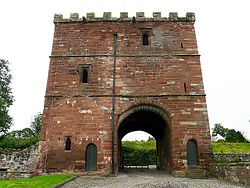Wetheral Priory Gatehouse
| Wetheral Priory Gatehouse | |
|---|---|
| Wetheral, Cumbria, England | |

The exterior of the gatehouse
|
|
| Coordinates | 54°52′47″N 2°49′50″W / 54.87971°N 2.83069°W |
| Site information | |
| Owner | English Heritage |
| Open to the public |
Yes |
| Site history | |
| Built | 15th century |
| Materials | Red sandstone |
Wetheral Priory Gatehouse is a 15th-century stone fortification in Wetheral, Cumbria. The priory was founded at the start of the 12th century and the gatehouse controlled the entrance to its outer courtyard. When the priory was dissolved in 1538 the gatehouse and a nearby stretch of wall were the only parts to survive. The gatehouse passed into the control of Carlisle Cathedral and became the local vicarage during the 16th and 17th centuries, before being used to store hay. Now part of a modern farm that occupies the former priory site, it is controlled by English Heritage and open to visitors. The crenellated gatehouse has three storeys, with the main entrance and porters' lodge on the ground floor and two domestic chambers on the upper floors. English Heritage considers the building to be "the finest medieval gatehouse in Cumbria".
Wetheral Priory Gatehouse was probably built in the 15th century and formed the entrance to the priory's outer courtyard. Wetheral Priory was a small Benedictine institution, founded by Ranulf le Meschin following the Norman invasion of Cumbria at the beginning of the 12th century. The motherhouse of the priory was St Mary's Abbey in York. The priory was known for a special right of sanctuary for criminals that had been granted to it by Henry I, allowing the priory to shelter felons who could reach the church and ring the bell there.
...
Wikipedia

